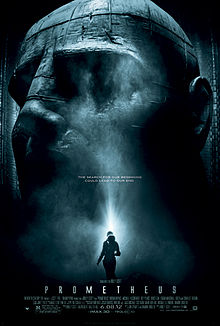
Future Fragments: Evolution, Religion and Prometheus
Written by: Anastasia Salter, Pop-Culture Editor
 (Spoilers ahead. I’d say watch the movie first, but…it’s not very good, so read on if you don’t care.) I really wanted to like Prometheus. Ridley Scott won my devotion with Blade Runner, and Alien + Aliens together form an impressive sequence of thoughtfully constructed sci-fi horror. But his latest film purports to address Big Questions of religion, faith, evolution and creation…even as the film itself doesn’t possess much of a soul. This lack of humanity takes a quest to “meet the maker” to a mundane and disappointing place with little to redeem man or alien.
(Spoilers ahead. I’d say watch the movie first, but…it’s not very good, so read on if you don’t care.) I really wanted to like Prometheus. Ridley Scott won my devotion with Blade Runner, and Alien + Aliens together form an impressive sequence of thoughtfully constructed sci-fi horror. But his latest film purports to address Big Questions of religion, faith, evolution and creation…even as the film itself doesn’t possess much of a soul. This lack of humanity takes a quest to “meet the maker” to a mundane and disappointing place with little to redeem man or alien.
Science fiction is intimately interwoven with religion, as most creation myths assume that our planet is at the center of the cosmos. The “invasion by aliens” themes inherently threaten these assumptions. After all, it’s one thing for both sides of a human war or football game to evoke gods rooting for their win, but aliens are outside that order. If aliens exist, it’s probable that many other conceptions would have to change. Sci-fi can do great things with this transformation: Babylon 5 explores religion brilliantly, particularly in the episode “The Parliament of Dreams” excerpted below; Sharon Shinn’s Archangel series imagines Christianity in a society discovering technology; Sarah Zettel’s Fool’s War considers religious responses to true artificial life.
The opening sequence of Prometheus suggests that the film will address the question of the origin of man, which is already a hotbed of science vs. religion tension in our culture. It’s also a misdirect, as ultimately this question is shunted aside as anything other than a pretense for an expensive crew of sci-fi stereotypes to make their way to a planet where two scientists believe they will find the alien race that created them. For the true believers, it’s a pilgrimage; for everyone else, it’s a potentially dangerous paycheck—or, in the case of the mission’s funder, a chance to try one last time to escape an all-too-near death. It’s also a scientific company (that creates androids) funding a mission that seems to dismiss science and evolution, as one of the characters notes even as the film ignores the problem altogether.
The team explores the planet and awakes the face-sucking aliens within, uncovering the fragments of memory that suggest that the “makers” have died out. Meanwhile, the robot schemes against the scientists for no particularly clear reason other than no Alien franchise move would be complete without an absolutely gory pregnancy. In one of the film’s most despicable moments, the religious scientist expresses her dismay at her inability to bear children (always the first concern when exploring the ruins of an alien civilization) and is infected by one of the creatures. When the alien-impregnated scientist checks herself in to the automated surgery machine and demands a C-section, what follows is one of the more graphic “abortions” ever, with enough blood and gore to rival the onscreen pregnancy and birth of Bella over in the Twilight series for recent movies acting s their own advertisement for birth control.
However, the politics of creation in this movie are disturbing far beyond any gory graphics Scott could put out there. There is a perversity to the persistence of the created—humanity trying to contact a creator race that was planning their destruction; David the android trying to reconcile himself to life among creators who see no purpose in his existence; the mindless face-suckers destroying the race that presumably created them along with any other life. The story is more Frankenstein than Alien, with everyone looking for meaning to an indifferent force, none moreso than the blindly religious scientist single-mindedly pursuing answers.
Similarly, the evolution of emotions and the expression of humanity from David the android in Prometheus promise but fails to deliver a poignant arc, as the android is introduced invading the memories of sleepers and in particular watching the painful childhood and religious development of the heroine. The interfaces David makes use of throughout are undoubtedly cool, as he pulls dreams into visible experience and replays the memories of the crew and of the mostly dead race inhabiting the newly discovered planet. But like all of the characters fumbling through Prometheus, David’s veneer of humanity fails to evolve.
It’s easy to speak of the movie in terms of unanswered questions (why *would* the “creators” leave their DNA in a dramatic ritual, offer a map to their universe, and then fill the planet with a biological weapon of mass destruction targeted right back on their creation? Srsly—where’s the logic?) There’s a final revelation to the film that could be significant. The “creators” are a match for human DNA, and they are half the parentage of the Aliens we know from later in the franchise. This perfect predator is thus partly descended from us—a connection that could provide an opportunity to contemplate the very nature of man, as the best of sci-fi engages. Instead, it’s a geek fan-service moment that passes too quickly for reflection, with as little consequence as any of the film’s gross-out violence. The final moments of Prometheus suggest that the film’s question—the purpose of humanity—is still important, even as the alien’s rise indicates that the answer (destruction) is already clear.
